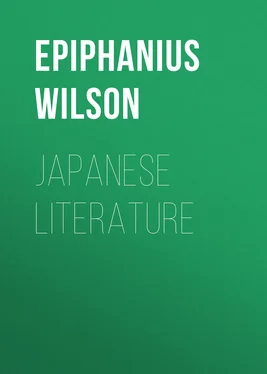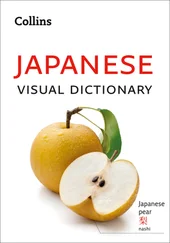Epiphanius Wilson - Japanese Literature
Здесь есть возможность читать онлайн «Epiphanius Wilson - Japanese Literature» — ознакомительный отрывок электронной книги совершенно бесплатно, а после прочтения отрывка купить полную версию. В некоторых случаях можно слушать аудио, скачать через торрент в формате fb2 и присутствует краткое содержание. Жанр: foreign_prose, Языкознание, foreign_antique, на английском языке. Описание произведения, (предисловие) а так же отзывы посетителей доступны на портале библиотеки ЛибКат.
- Название:Japanese Literature
- Автор:
- Жанр:
- Год:неизвестен
- ISBN:нет данных
- Рейтинг книги:3 / 5. Голосов: 1
-
Избранное:Добавить в избранное
- Отзывы:
-
Ваша оценка:
- 60
- 1
- 2
- 3
- 4
- 5
Japanese Literature: краткое содержание, описание и аннотация
Предлагаем к чтению аннотацию, описание, краткое содержание или предисловие (зависит от того, что написал сам автор книги «Japanese Literature»). Если вы не нашли необходимую информацию о книге — напишите в комментариях, мы постараемся отыскать её.
Japanese Literature — читать онлайн ознакомительный отрывок
Ниже представлен текст книги, разбитый по страницам. Система сохранения места последней прочитанной страницы, позволяет с удобством читать онлайн бесплатно книгу «Japanese Literature», без необходимости каждый раз заново искать на чём Вы остановились. Поставьте закладку, и сможете в любой момент перейти на страницу, на которой закончили чтение.
Интервал:
Закладка:
Some days passed, and due requiem services were carefully performed. The Emperor was still plunged in thought, and no society had attractions for him. His constant consolation was to send messengers to the grandmother of the child, and to make inquiries after them. It was now autumn, and the evening winds blew chill and cold. The Emperor—who, when he saw the first Prince, could not refrain from thinking of the younger one—became more thoughtful than ever; and, on this evening, he sent Yugei-no Miôbu 10 10 A Court lady, whose name was Yugei, holding an office called "Miôbu."
to repeat his inquiries. She went as the new moon just rose, and the Emperor stood and contemplated from his veranda the prospect spread before him. At such moments he had usually been surrounded by a few chosen friends, one of whom was almost invariably his lost love. Now she was no more. The thrilling notes of her music, the touching strains of her melodies, stole over him in his dark and dreary reverie.
The Miôbu arrived at her destination; and, as she drove in, a sense of sadness seized upon her.
The owner of the house had long been a widow; but the residence, in former times, had been made beautiful for the pleasure of her only daughter. Now, bereaved of this daughter, she dwelt alone; and the grounds were overgrown with weeds, which here and there lay prostrated by the violence of the winds; while over them, fair as elsewhere, gleamed the mild lustre of the impartial moon. The Miôbu entered, and was led into a front room in the southern part of the building. At first the hostess and the messenger were equally at a loss for words. At length the silence was broken by the hostess, who said:—
"Already have I felt that I have lived too long, but doubly do I feel it now that I am visited by such a messenger as you." Here she paused, and seemed unable to contend with her emotion.
"When Naishi-no-Ske returned from you," said the Miôbu, "she reported to the Emperor that when she saw you, face to face, her sympathy for you was irresistible. I, too, see now how true it is!" A moment's hesitation, and she proceeded to deliver the Imperial message:—
"The Emperor commanded me to say that for some time he had wandered in his fancy, and imagined he was but in a dream; and that, though he was now more tranquil, he could not find that it was only a dream. Again, that there is no one who can really sympathize with him; and he hopes that you will come to the Palace, and talk with him. His Majesty said also that the absence of the Prince made him anxious, and that he is desirous that you should speedily make up your mind. In giving me this message, he did not speak with readiness. He seemed to fear to be considered unmanly, and strove to exercise reserve. I could not help experiencing sympathy with him, and hurried away here, almost fearing that, perhaps, I had not quite caught his full meaning."
So saying, she presented to her a letter from the Emperor. The lady's sight was dim and indistinct. Taking it, therefore, to the lamp, she said, "Perhaps the light will help me to decipher," and then read as follows, much in unison with the oral message: "I thought that time only would assuage my grief; but time only brings before me more vividly my recollection of the lost one. Yet, it is inevitable. How is my boy? Of him, too, I am always thinking. Time once was when we both hoped to bring him up together. May he still be to you a memento of his mother!"
Such was the brief outline of the letter, and it contained the following:—
"The sound of the wind is dull and drear
Across Miyagi's 11 11 Miyagi is the name of a field which is famous for the Hagi or Lespedeza, a small and pretty shrub, which blooms in the Autumn. In poetry it is associated with deer, and a male and female deer are often compared to a lover and his love, and their young to their children.
dewy lea,
And makes me mourn for the motherless deer
That sleeps beneath the Hagi tree."
She put gently the letter aside, and said, "Life and the world are irksome to me; and you can see, then, how reluctantly I should present myself at the Palace. I cannot go myself, though it is painful to me to seem to neglect the honored command. As for the little Prince, I know not why he thought of it, but he seems quite willing to go. This is very natural. Please to inform his Majesty that this is our position. Very possibly, when one remembers the birth of the young Prince, it would not be well for him to spend too much of his time as he does now."
Then she wrote quickly a short answer, and handed it to the Miôbu. At this time her grandson was sleeping soundly.
"I should like to see the boy awake, and to tell the Emperor all about him, but he will already be impatiently awaiting my return," said the messenger. And she prepared to depart.
"It would be a relief to me to tell you how a mother laments over her departed child. Visit me, then, sometimes, if you can, as a friend, when you are not engaged or pressed for time. Formerly, when you came here, your visit was ever glad and welcome; now I see in you the messenger of woe. More and more my life seems aimless to me. From the time of my child's birth, her father always looked forward to her being presented at Court, and when dying he repeatedly enjoined me to carry out that wish. You know that my daughter had no patron to watch over her, and I well knew how difficult would be her position among her fellow-maidens. Yet, I did not disobey her father's request, and she went to Court. There the Emperor showed her a kindness beyond our hopes. For the sake of that kindness she uncomplainingly endured all the cruel taunts of envious companions. But their envy ever deepening, and her troubles ever increasing, at last she passed away, worn out, as it were, with care. When I think of the matter in that light, the kindest favors seem to me fraught with misfortune. Ah! that the blind affection of a mother should make me talk in this way!"
"The thoughts of his Majesty may be even as your own," said the Miôbu. "Often when he alluded to his overpowering affection for her, he said that perhaps all this might have been because their love was destined not to last long. And that though he ever strove not to injure any subject, yet for Kiri-Tsubo, and for her alone, he had sometimes caused the ill-will of others; that when all this has been done, she was no more! All this he told me in deep gloom, and added that it made him ponder on their previous existence."
The night was now far advanced, and again the Miôbu rose to take leave. The moon was sailing down westward and the cool breeze was waving the herbage to and fro, in which numerous mushi were plaintively singing. 12 12 In Japan there is a great number of "mushi" or insects, which sing in herbage grass, especially in the evenings of Autumn. They are constantly alluded to in poetry.
The messenger, being still somehow unready to start, hummed—
"Fain would one weep the whole night long,
As weeps the Sudu-Mushi's song,
Who chants her melancholy lay,
Till night and darkness pass away."
As she still lingered, the lady took up the refrain—
"To the heath where the Sudu-Mushi sings,
From beyond the clouds 13 13 In Japanese poetry, persons connected with the Court, are spoken of as "the people above the clouds."
one comes from on high
And more dews on the grass around she flings,
And adds her own, to the night wind's sigh."
A Court dress and a set of beautiful ornamental hairpins, which had belonged to Kiri-Tsubo, were presented to the Miôbu by her hostess, who thought that these things, which her daughter had left to be available on such occasions, would be a more suitable gift, under present circumstances, than any other.
Читать дальшеИнтервал:
Закладка:
Похожие книги на «Japanese Literature»
Представляем Вашему вниманию похожие книги на «Japanese Literature» списком для выбора. Мы отобрали схожую по названию и смыслу литературу в надежде предоставить читателям больше вариантов отыскать новые, интересные, ещё непрочитанные произведения.
Обсуждение, отзывы о книге «Japanese Literature» и просто собственные мнения читателей. Оставьте ваши комментарии, напишите, что Вы думаете о произведении, его смысле или главных героях. Укажите что конкретно понравилось, а что нет, и почему Вы так считаете.












